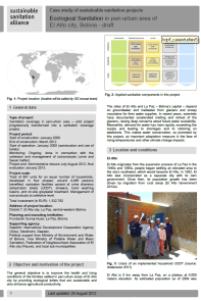Ecological Sanitation in peri-urban area of El Alto city, Bolivia - EcoSan a gran escala en una zona periurbana El Alto, Bolivia (in English and Spanish) - Case study of sustainable sanitation projects
Suntura, C., Sandoval, B. (2012)

Published in: 2012
Publisher:
SuSanA, Fundación Sumaj Huasi, Stockholm Environment Institute
Author:
Suntura, C., Sandoval, B.
Uploaded by:
SuSanA secretariat
Partner profile:
common upload
18937 Views
871 Downloads
Location of library entry
Content - Summary
This case study describes the project of UDDTs construction in El Alto, Bolivia. The project developed by the NGO Fundación Sumaj Huasi (La Paz) and had financial support from the Swedish International Development Cooperation Agency (Sida), technical support from Stockholm Environment Institute (SEI) and political support from Ministry of Environment and Water of Bolivia, Vice Ministry of Potable Water and Basic Sanitation, Federation of Neighbourhood Association of El Alto city (Fejuve), and local sub municipalities
The project constructed 897 UDDT units and benefited around 4,485 persons. It was implemented the District 7, a peri-urban area with an estimated population of roughly 27,000, composed mainly of Aymara indigenous people. The technology applied is a UDDT toilet with container, treatment of grey water at the household level, and collective management of the urine and faeces. Further tests with the sub-products guarantee total safe reuse of the nutrients and water.
The EcoSan approach was chosen due to its basic principle of zero or minimal use of water, an important adaptation measure in the face of rising temperatures and other climate change impact, while closing loops of water and nutrients. EcoSan also has been shown to be effective and lower in cost than centralised sanitation technologies. Further elements components of the project include collection, treatment and collective management of the products.
---
Este caso de estudio describe el proyecto de saneamiento ecológico en El Alto, Bolivia. El proyecto fue desarrollado por la ONG Fundación Sumaj Huasi (La Paz) y contó con el apoyo financiero de la Agencia Sueca de Desarrollo Internacional (Sida), el apoyo técnico del Instituto Ambiental de Estocolmo (SEI) y el apoyo político del Ministerio de Medio Ambiente y Agua de Bolivia Vice Ministerio de Agua Potable y Saneamiento Básico, La Federación de Juntas Vecinales de la ciudad de El Alto (Fejuve-El Alto), y sub- secciones de municipios.
El proyecto construyó 897 unidades sanitarias y benefició alrededor 4.485 personas. Se implementó el proyecto en Distrito 7, una zona peri-urbana con una población estimada de 27.000, compuesta principalmente por los indígenas aimaras. La tecnología aplicada es un inodoro UDDT (sanitarios secos con desviación de orina) con un contenedor, manejo de aguas grises en los hogares, y la gestión colectiva de orina y heces. El tratamiento y seguimiento de calidad de los sub-productos garantizan la reutilización segura de los nutrientes.
El enfoque ecosan fue elegido debido a su principio básico de cero o mínimo uso de agua, una medida de adaptación importante de cara a las crecientes temperaturas y otros efectos del cambio climático, y el cierre de ciclo de agua y nutrientes. La tecnología decentralizada de EcoSan también ha demostrado ser eficaz y con un costo menor comparado con tecnologías convencionales de saneamiento centralizado.
Bibliographic information
Suntura, C., Sandoval, B. (2012). Ecological Sanitation in peri-urban area of El Alto city, Bolivia - EcoSan a gran escala en una zona periurbana El Alto, Bolivia (in English and Spanish) - Case study of sustainable sanitation projects. SuSanA, Fundación Sumaj Huasi, Stockholm Environment Institute
Filter tags
Case studies in SuSanA template English Latin America & Caribbean Peri-urban Spanish Urine diversion dehydration toilets (UDDTs)














